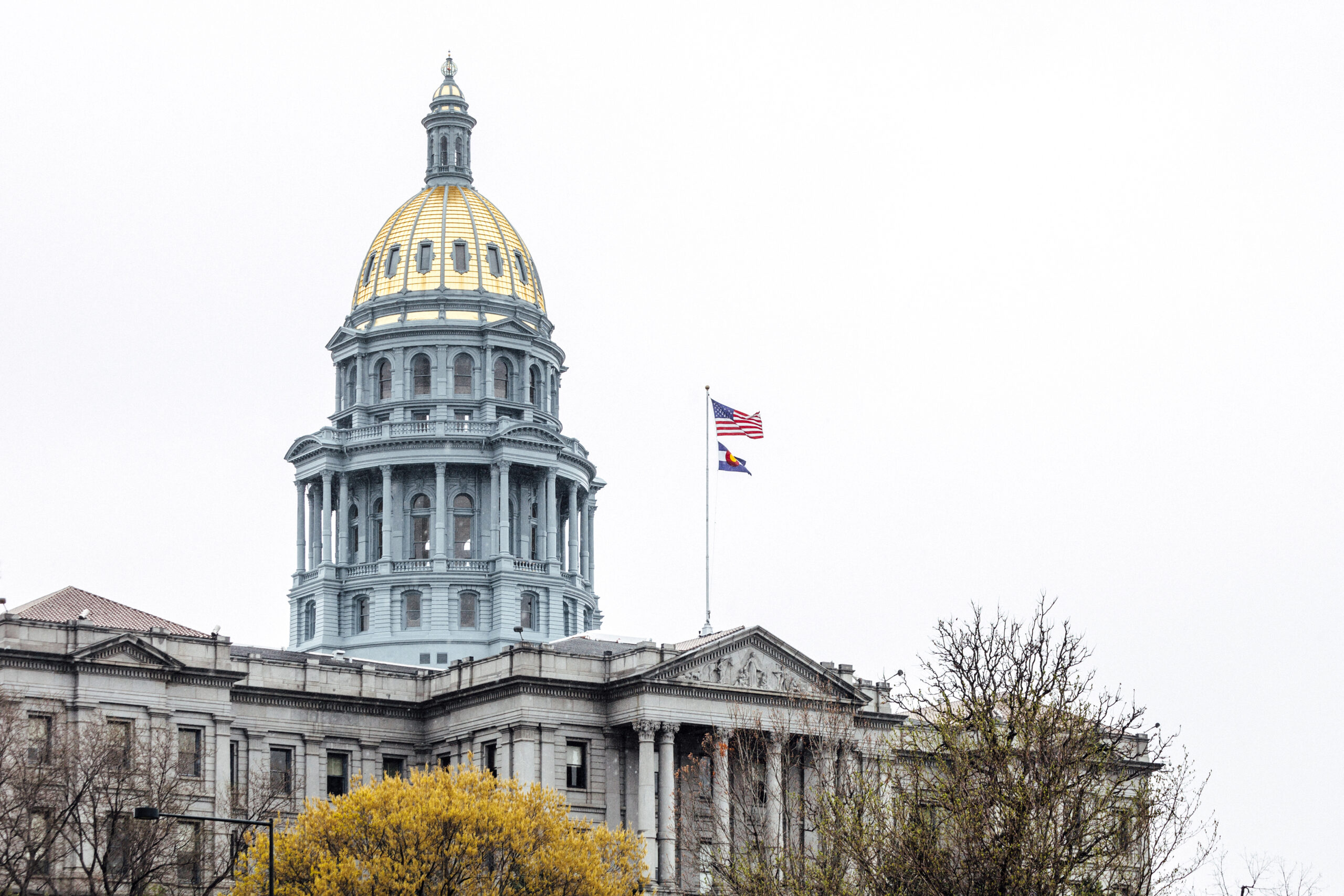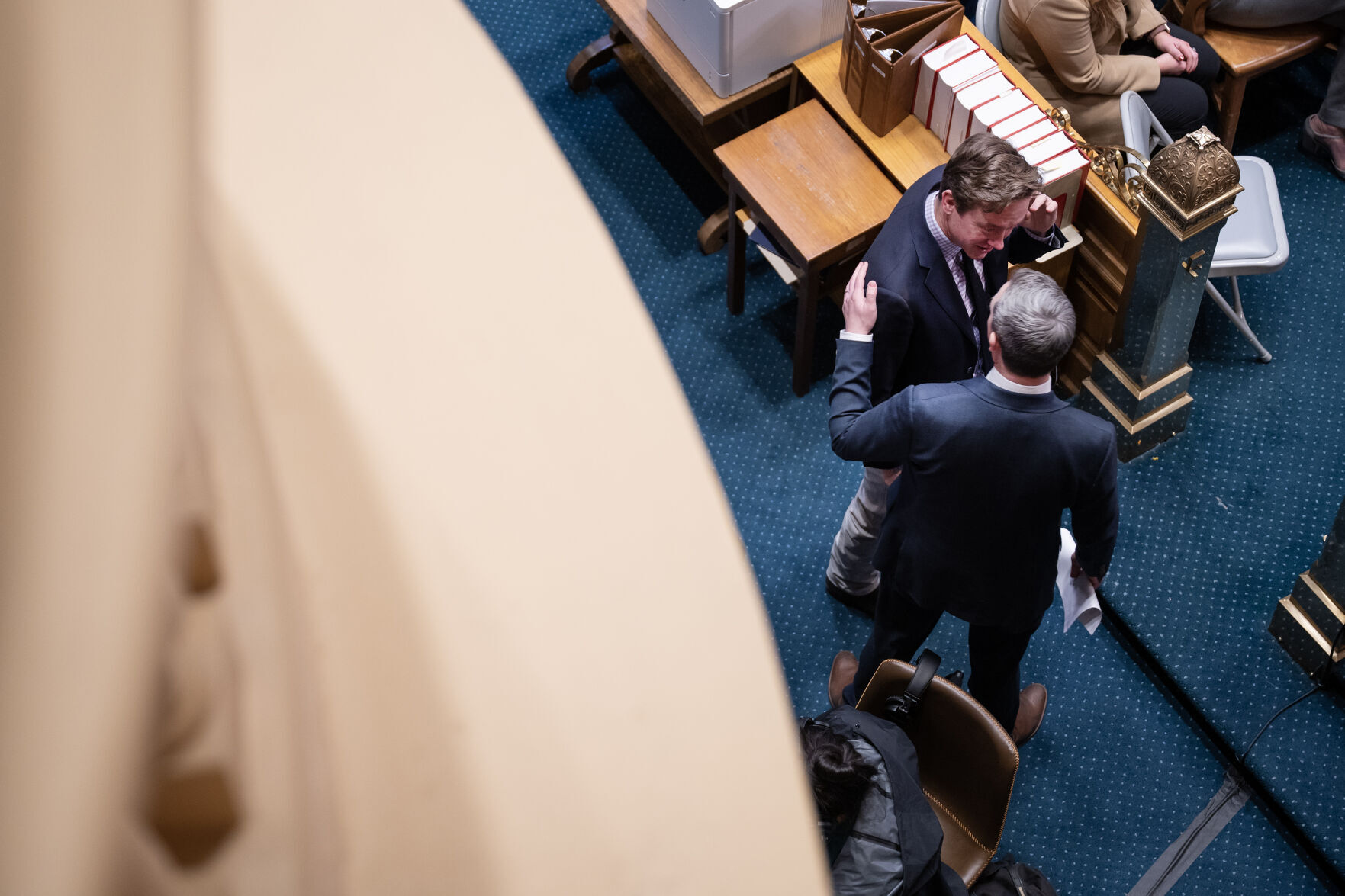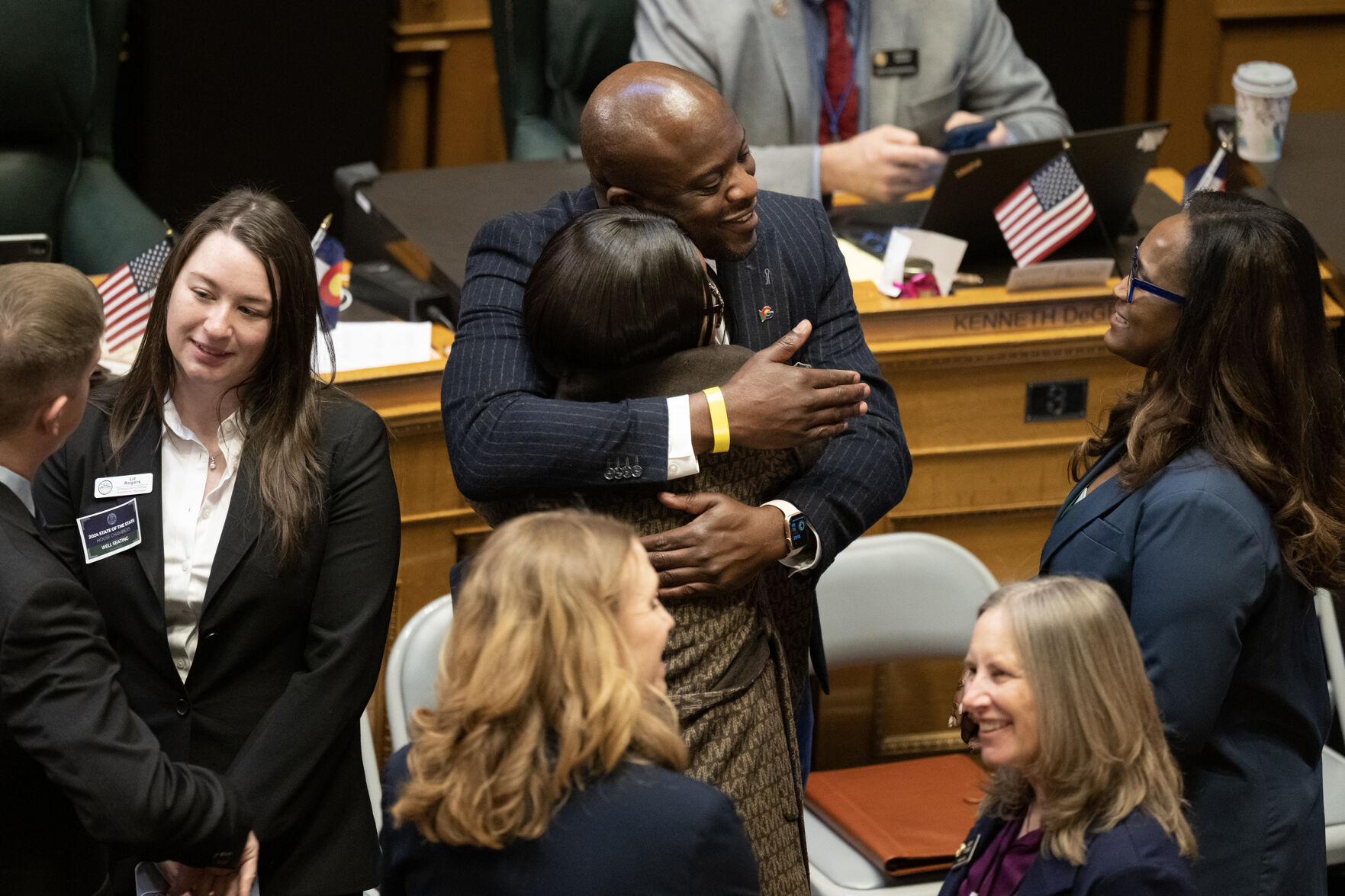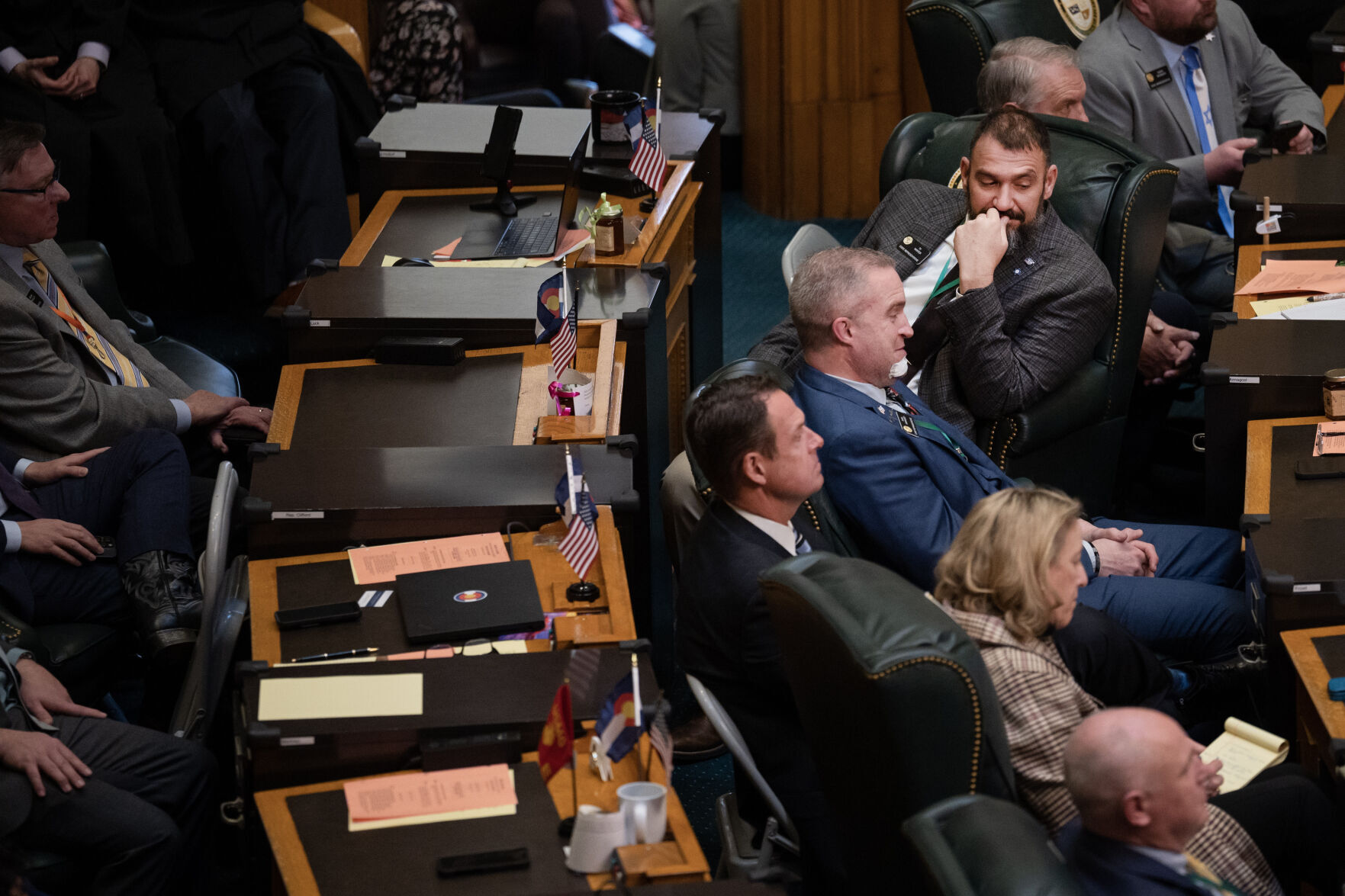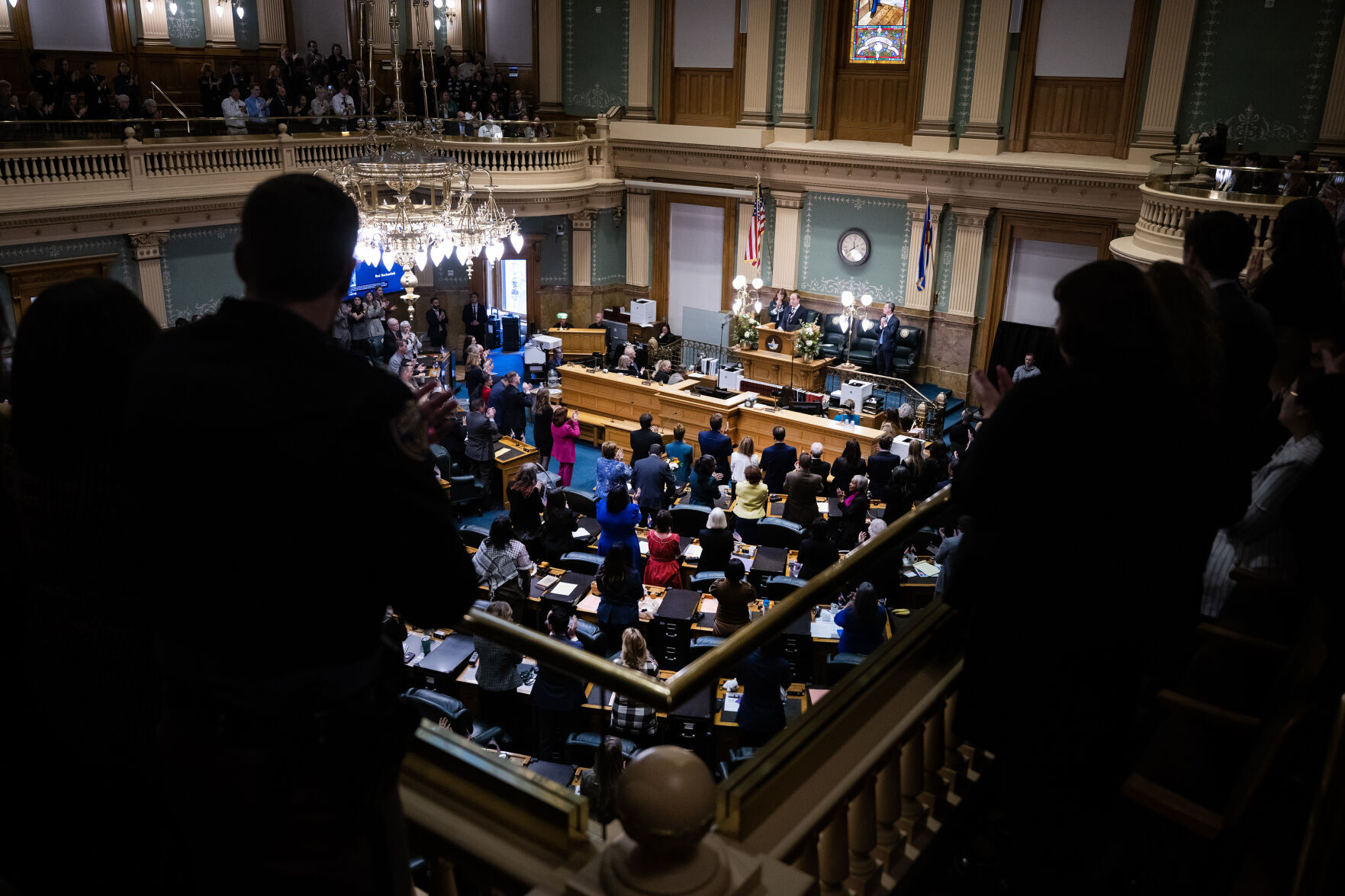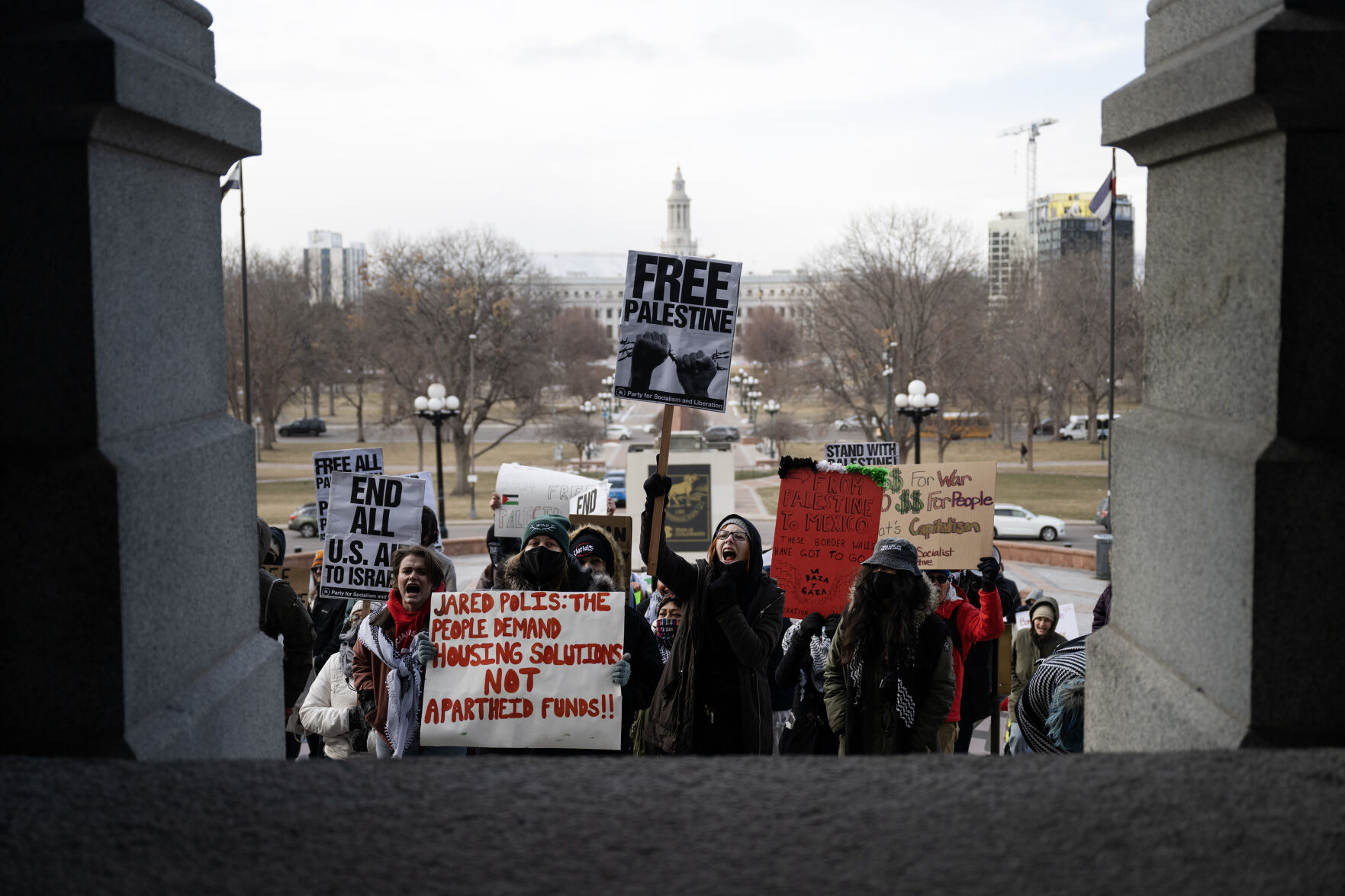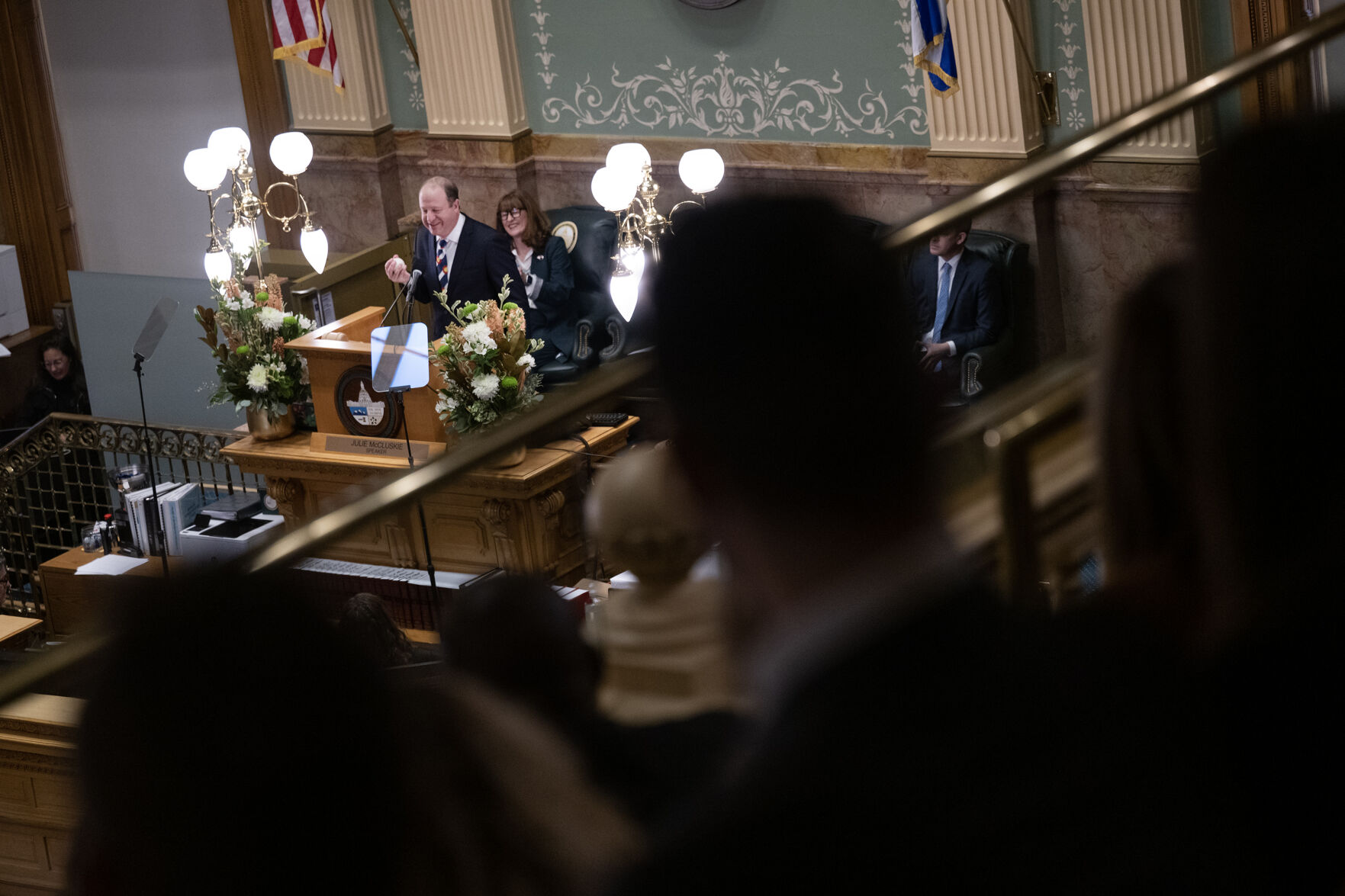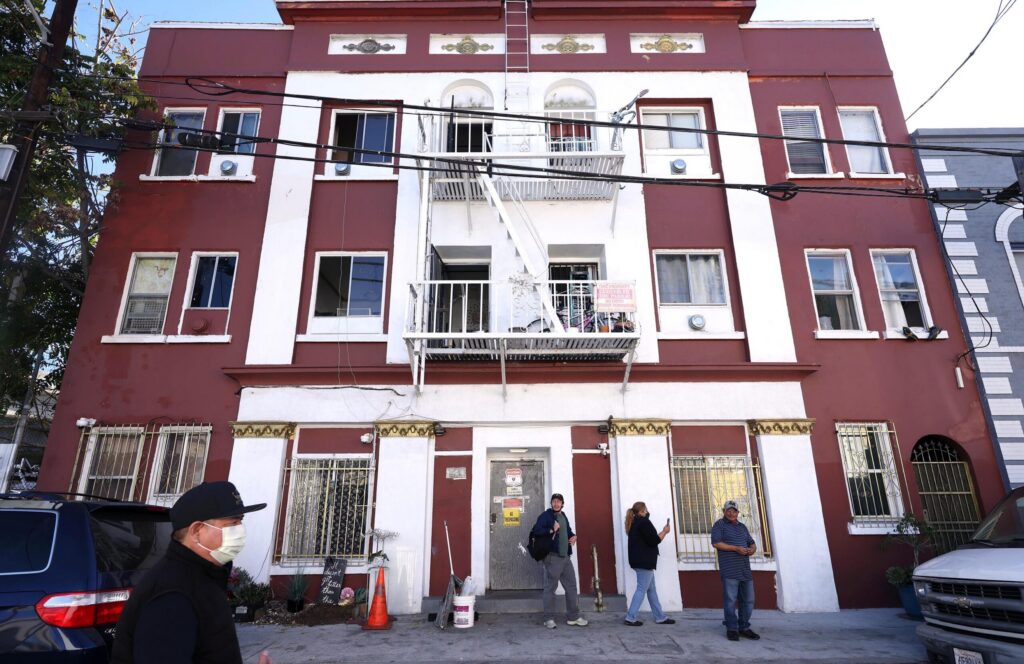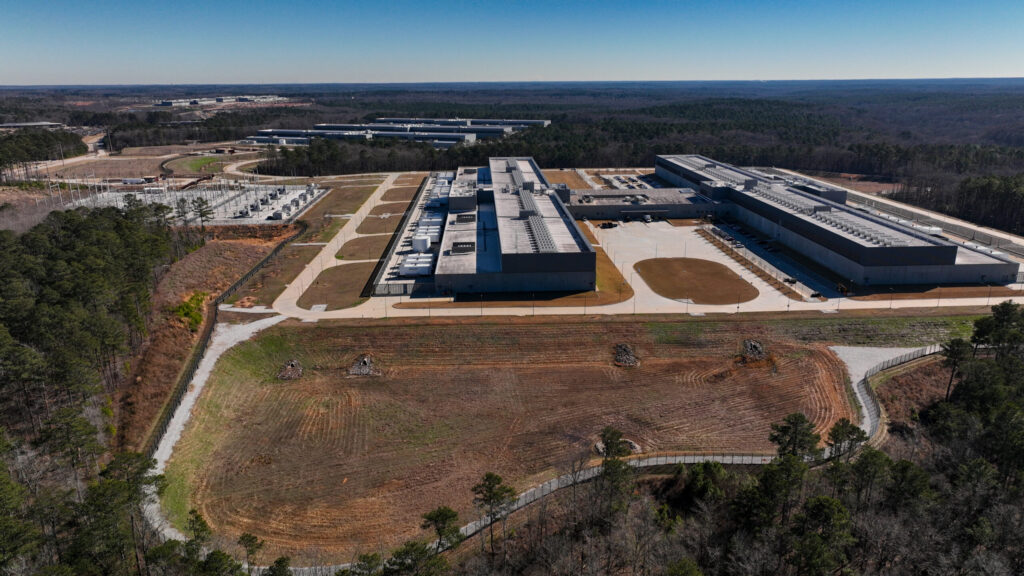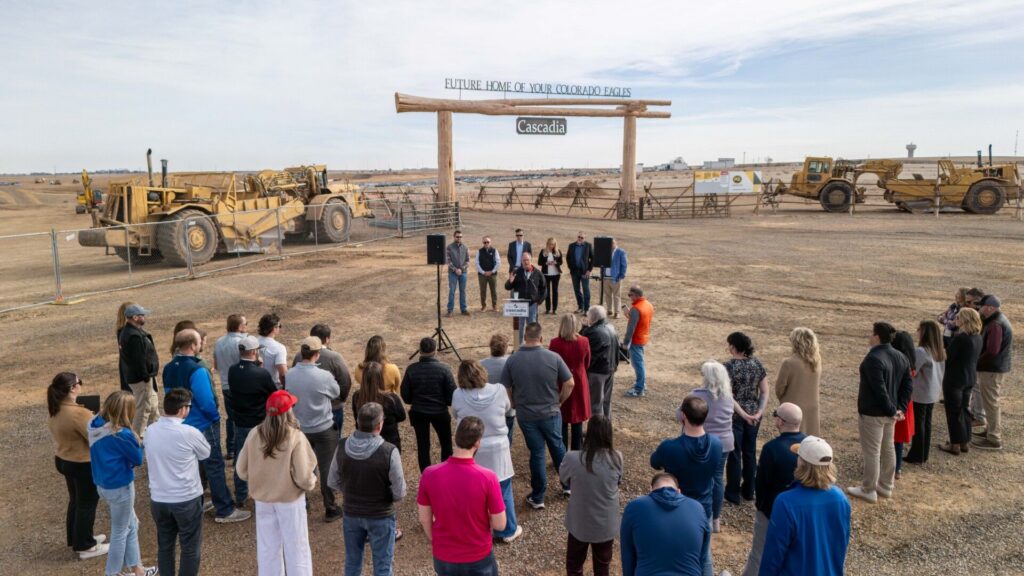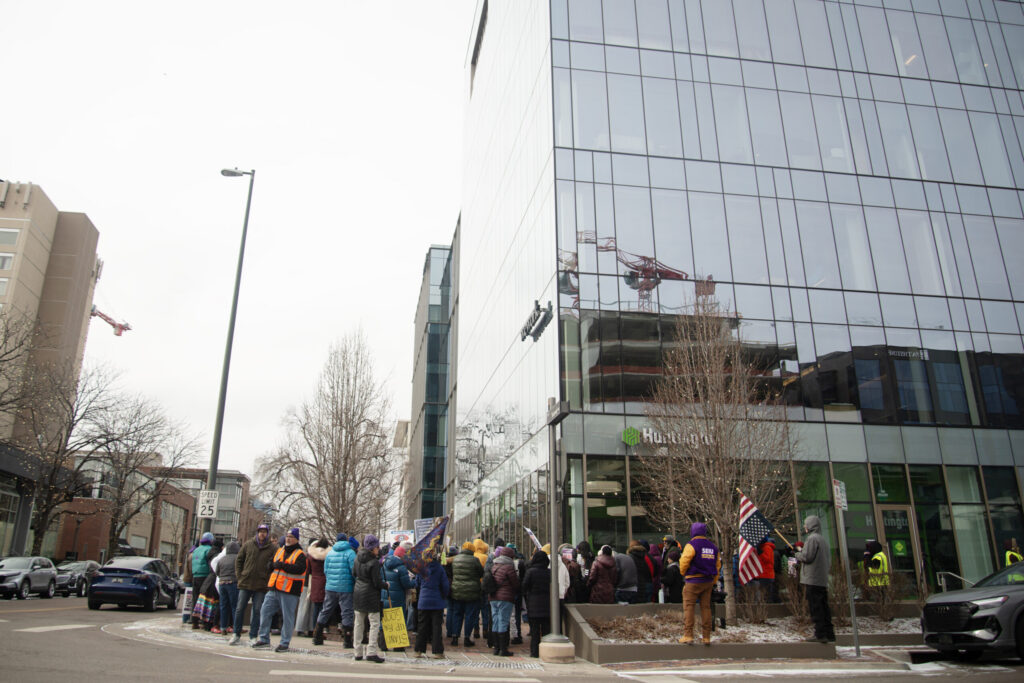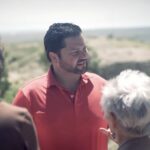LIVE UPDATES: Gov. Jared Polis: ‘Sense of hopelessness’ around housing permeates Colorado
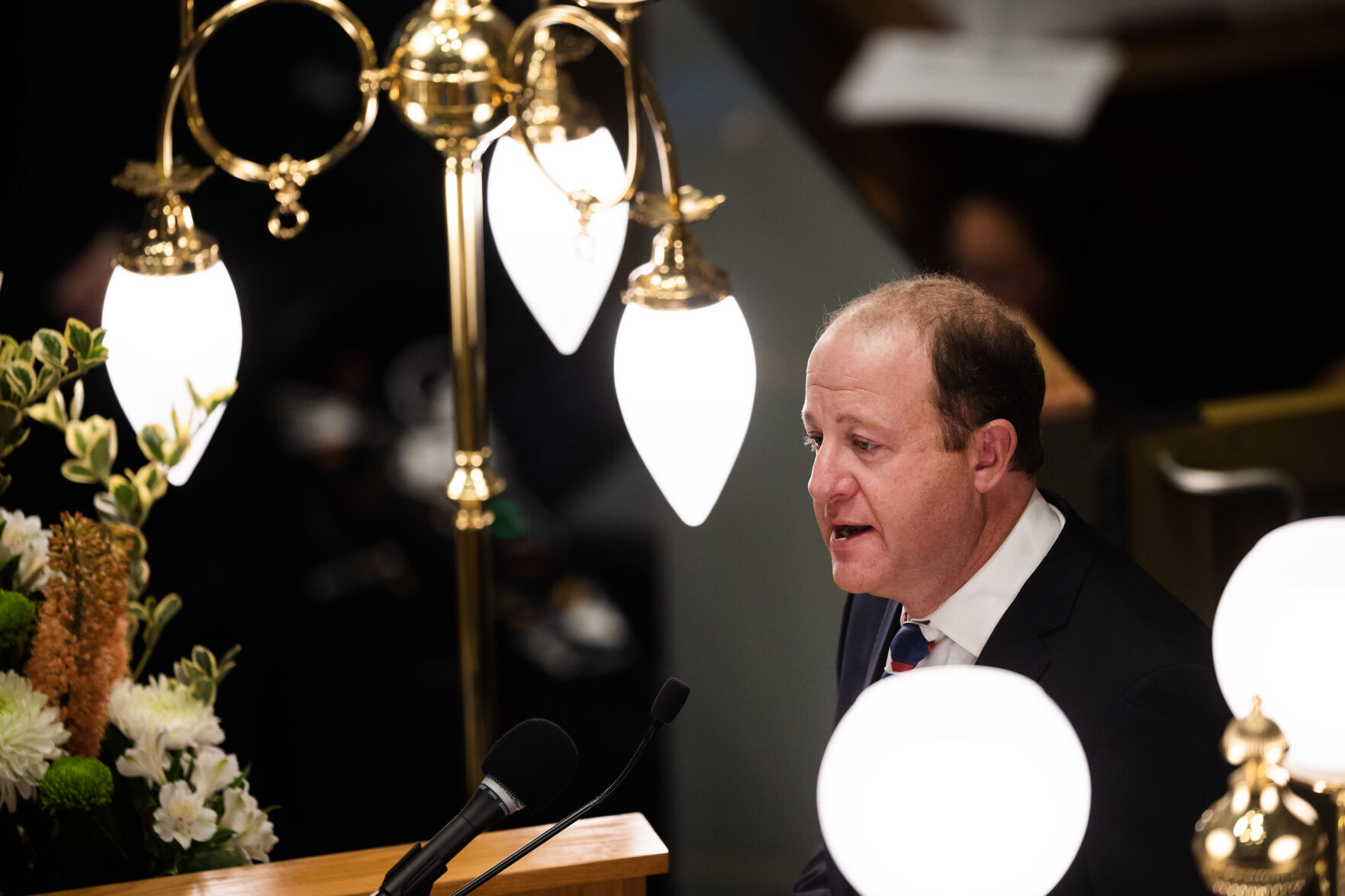
Editor’s note: Colorado Politics reporters are covering the opening ceremonies of the second regular session of the 74th General Assembly. Follow us here for updates.
Colorado Gov. Jared Polis gives State of State address Thursday, Jan. 11, 2024.
Colorado Channel
11 a.m. An annotation of Gov. Jared Polis’ State of the State address
Gov. Jared Polis: “At long last, Colorado is the rightful permanent home of U.S. Space Command, ensuring our national security in the increasingly important space domain.”
Annotation: The Air Force in July announced that it has decided that U.S. Space Command’s permanent headquarters will remain in Colorado Springs, instead of moving to Huntsville, Ala. The long-awaited decision caps more than two years of wrangling by officials from both Colorado and Alabama after former President Donald Trump announced in the final days of his administration that the command’s headquarters would move to Alabama.
Polis: “There is a real sense of hopelessness and despair in our state around housing that’s on par, in many ways, with how people feel about the divisiveness of our national politics.”
Annotation: One study says Colorado lacks 100,000 housing units, and that 80% of Coloradans live in a county with an aggregate housing supply shortage. The study adds that over the years, Colorado has become one of the most unaffordable states for renters in entire country.
Polis: “As you might be able to tell, housing policy that creates more affordable choices for Coloradans is my Roman Empire. If you don’t get that joke, feel free to ask someone from Gen Z.”
Annotation: This a trend in TikTok in which online users, mostly women, ask their spouses how often they think about the Roman Empire.
Polis: “Thanks to Senate Bill 260 from 2021, which supercharged transportation funding for the state, and significant Federal funding, roads are finally getting better across the state of Colorado, but we’re not done yet. We have the planes, and we have the automobiles, we just need the trains.”
Annotation: Senate Bill 21-260 established four state enterprises and modified a fifth to pay for transportation projects. The measure, which Gov. Jared Polis signed into law, is a $5.4 billion, 10-year plan to build out roads and bridges, create electric vehicle charging stations, boost mass transit and mitigate air pollution.
Polis: “So. let’s actually deliver on the housing and transit solutions that Coloradans are demanding. As Yoda would say, ‘Do or Do Not, there is no try.’
Annotation: The governor, a big of fan of science fiction, has repeatedly quoted Yoda in all kinds of settings. In 2021, Polis took time between bill signings to share a favorite one-liner, which also showed off his love of science fiction: “Why did the ‘Star Wars’ movies come out in the sequence: 4,5,6,1,2,3,7,8,9? Because, in charge of the order Yoda was.”
Polis: “Sadly, in the last few months, there’s been a dramatic increase in horrific acts of hate across the world, including here at home. Between October 7 and January 7, the Anti Defamation League recorded a 360 percent increase in antisemitic incidents nationwide. The rise in antisemitism, Islamophobia, and hate in all forms is unacceptable in Colorado.”
Annotation: In November, Polis unequivocally called on Coloradans – and, by extension, Americans – to stand behind Israel, which is at war with Hamas following the latter’s attack that killed 1,200 Israelis. “Our greatest strength is our ability to stand together to support the people of Israel in their time of need to be an example of hope and light that others can follow and to stand against hate,” the governor said during the Jewish National Fund-USA conference in Denver. The governor said Colorado is “known for standing shoulder to shoulder against hate,” a theme he stuck to in his speech. “We must fight all forms of hatred with relentless courage and steadfast determination so that one day our children and their children can make a world without this pain and suffering,” Polis said.
Polis: “We are proposing additional investments to prevent convicted felons from illegally purchasing firearms. Each year, thousands of people who are prohibited from purchasing a firearm try to do so illegally.”
Annotation: This year’s Senate Bill 3 would provide over $1.69 million to the Colorado Bureau of Investigation to investigate illegal activity involving firearms, including illegal transfers and attempts to illegally obtain guns. The bill is sponsored by Democratic Sen. Tom Sullivan of Centennial and Rep. Meg Froelich of Greenwood Village.
Polis: “I’m also proud that just a few months ago, Colorado voters passed Proposition II, which dedicates an additional $23.7 Million to preschool, expanding hours for Colorado children and making preschool even better next year. We are so excited that in its very first year nearly 40,000 children are enrolled in preschool, saving each family more than $6,000 per year.”
Annotation: The expanded access came after Colorado voters approved funding in 2020 for a “mixed-delivery” system of private and public providers, a step toward one of Polis’ key campaign promises. Enrollment issues and funding uncertainties have arisen with the rollout of the universal pre-kindergarten program, which is also under litigation. Last week, a federal judge heard arguments and testimony over whether the program unconstitutionally forces a pair of Catholic preschools to violate their religious beliefs about sexual orientation and gender identity in order to participate as providers. In August, the Archdiocese of Denver and other plaintiffs brought suit against the state, arguing the preschools under the archdiocese’s control wished to participate in the publicly funded pre-K program but could not do so as long as they are prohibited from discriminating on the basis of LGBTQ status.
Polis: “This year, thanks to the leadership of the people in this room, after more than a decade we are finally eliminating the Budget Stabilization Factor.”
Annotation: Lawmakers this year vow to make the final payoff of $1 billion-plus debt to K-12 education, known as the budget stabilization factor. Lawmakers have earmarked money to pay that amount over the years. The BS factor, originally known as the “negative factor,” started in 2009 as a debt to K-12, with the funds used by lawmakers to balance the state budget in the wake of the 2008 Great Recession. The original debt started at $130 million, but, by 2012, it had ballooned to $1.011 billion. By 2020-21, the debt was down to $572.4 million, but, fearing another recession, lawmakers bumped it back up to its highest level ever – at $1.052 billion. Polis, in his budget presentation to the Joint Budget Committee in November, pledged to pay off the last of the debt, which now stands at $141.2 million.
Polis: “Right now there are about two job openings for every unemployed Coloradan. We want every person in Colorado to be able to build a good life and a good career on their own terms, and we are creating many different ways to do that – from dual and concurrent enrollment to low-cost credentialing.”
Annotation: Last year, The Denver Gazette fact-checked this claim and there are, indeed, two jobs available for every unemployed individual in Colorado. Ryan Gedney, principal economist for the state labor department, said they are looking at the data based on the Job Openings and Labor Turnover Survey, or JOLTS program, from the U.S. Bureau of Labor Statistics and comparing it to the number of unemployed individuals in a given month. In November 2022, there were 231,000 job openings and 113,622 unemployed individuals, equal to 2.03 openings per unemployed person, according to Gedney.
Polis: “This has led to historic successes including Reinsurance and the Colorado Option, both of which have been cost-saving game-changers for people accessing healthcare in our state. Since its creation, reinsurance has saved thousands of dollars for families all across our state.”
Annotation: Polis administration officials have perennially pointed to the state insurance program – and their own actions – as reasons for the savings they insisted residents will see next year. But a trade group of insurance companies isn’t buying the official line, arguing that insurance carriers already actively negotiate with hospitals to keep costs low. Indeed, while a majority of health insurers are poised to reduce premiums next year, that doesn’t mean insurance costs are going down. In fact, those who buy their health insurance on the individual market will pay about 9.7% more in 2024, according to the state Division of Insurance, which finalized its rate review for health insurance premiums for next year. In the small group market, which applies to businesses with fewer than 100 employees, premiums are expected to increase by 8%.
Polis: “We’ve also capped the cost of insulin and, last session, thanks to the leadership of Senator Roberts and Representatives Mabrey and Representative Jodeh, epi pens, as well.”
Annotation: In June, Gov. Jared Polis signed a Democratic-backed measure aimed at countering the rising prices of epinephrine auto-injectors, which can save the lives of people undergoing a severe allergic reaction. During the legislative session, lawmakers heard that, while EpiPens cost around $8 to manufacture, the price for uninsured consumers may balloon to upwards of $690. Last month, a federal declined to block the new Colorado law that also requires manufacturers to reimburse or resupply pharmacies with the devices in certain circumstances. While U.S. District Court Judge Daniel D. Domenico turned down the request for a preliminary injunction, he also rejected Colorado’s motion to dismiss the case outright. EpiPen manufacturer Teva Pharmaceuticals USA, Inc. had shown the state will likely violate its constitutional rights by taking its property without adequate compensation.
Polis: “We are already on track to exceed our goal of 80% clean electricity by 2030 – just six years from now. We have one of the most ambitious strategies in the country to reduce local air pollution from the oil, gas, and transportation industries, including achieving electric vehicle sales that are six times higher than when I took office.”
Annotation: The governor’s $3.1 billion mandate to upgrade energy efficiency in large buildings takes effect in October. So do civil penalties of up to $5,000 per month for buildings not in compliance with Air Quality Control Commission Rule 28, which mandates building energy efficiency upgrades for some 8,000 buildings larger than 50,000 square feet. Owners will be required to reduce energy use by 7% by 2026 and 20% by 2030, below 2021 energy use levels. Critics said the rule is unprecedented, and, in some cases, may be unachievable. Some also argued that the authority the state is exercising to come up and implement the rule exceeds constitutional norms. Proponents said the new regulations will improve air quality, upgrade the quality of buildings in Colorado, and must be done all at once to make any substantial effect. State commissioners maintained that passing the rule is both necessary and mandated by the enabling statute. The law’s authors said buildings represent a “significant source of greenhouse gas pollution” in Colorado.
Polis: “We are strengthening native biodiversity and restoring balance to our ecosystems by bringing back native species like the Canada Lynx, the Black-Footed Ferret, and as of mid-December, we successfully met the voter mandated deadline for reintroduction of Gray Wolves. We also need to protect that progress by continuing to invest in non-lethal conflict minimization to help our farmers and ranchers thrive.”
Annotation: Colorado wildlife officials captured wolves from Oregon and released them in Grand County in December, the culmination of a reintroduction program that voters narrowly approved in 2020. Suburbs and cities along Colorado’s Front Range, which includes Denver, carried the vote, despite strong opposition across less-densely populated counties where the wolves would be released. More releases are planned over the next several years. To help mitigate the anticipated costs of the expected conflict, Colorado is getting about $2 million out of more than $22 million in U.S. Department of Agriculture funds recently allocated by the Regional Conservation Partnership Program for five western states. Ranchers and livestock growers, who filed a lawsuit but failed to delay their reintroduction, fear attacks will worsen, adding to a spate of perceived assaults on western Colorado’s rural communities as the state’s Democratic leaders embrace clean energy and tourism, eclipsing economic mainstays such as fossil fuel extraction and agriculture. Two of the first five wolves released came from a pack that Oregon officials said preyed on livestock in the last two years. (Editor’s note: The Associated Press contributed to this annotation).
Polis: “As demonstrated by our healthy surplus in Colorado, taxes are simply too high: income taxes, property taxes, and the state sales tax.”
Annotation: The governor has repeatedly expressed support for cutting taxes. In a debate over Proposition HH in October, the governor said, “I think it’s better not to tax money from people in the first place rather than over-collect and refund via TABOR. It’s better to simply cut taxes on the outset. This cuts the rates and saves people money.” Colorado voters have favored tax cuts. In 2020, voters took down Colorado’s income tax rate from 4.63% to 4.55%. And in 2022, Coloradans further slashed that rate to 4.4%.
Polis: “We are working closely with the IRS and are steadfast in our commitment to help Coloradans keep more of their hard-earned money.”
Annotation: Colorado taxpayers can breathe a sigh of relief after U.S. Sen. Michael Bennet confirmed on Tuesday that the Internal Revenue Service won’t treat refunds issued under the state’s Taxpayer’s Bill of Rights as taxable income this year. An aide to the Colorado Democrat said the lawmaker secured the commitment in a meeting with the IRS and Gov. Jared Polis. Members of the state’s congressional delegation and Polis last summer called on the IRS to “resolve the current ambiguity” that resulted from proposed agency rules that left the status of TABOR refunds unclear for the 2023 tax year.
Polis: “Let me be clear: this isn’t just some feel good initiative or hollow exercise. Our very democracy depends on people being able to disagree with one another – passionately, emphatically – and still being able to work together with mutual respect and dignity. When that is no longer possible, when policy arguments become personal attacks, and when people start to paint the other side not as colleagues who disagree, but as enemies, we are entering dangerous territory.”
Annotation: Polis and Gov. Spencer Cox of Utah have embarked on a project to rescue American politics from what they believe is a path that will lead, at its worst, to the destruction of democratic institutions. Their pitch? Disagree better. The way the two governors put it, to “disagree better” doesn’t translate to being “nice” or giving up one’s principles. It means engagement in the political discourse with a sense of humility – that perhaps one does not hold all the answers and, therefore, listening to the other side is not only laudable but ultimately necessary.
9 a.m. Polis delivers state of the state address
Gov. Jared Polis will give his state of the state address in the Colorado House at 11 a.m. today. Earlier this month, Polis told Colorado Politics he plans to emphasize affordable housing, public safety and education, and build on what his administration accomplished over the years. He also noted the immigration crisis plaguing Denver and said he is working with the White House and other governors to find solutions.
11:45 a.m. House Republican leader promises ‘vigorous debate’ in this year’s session
House Minority Leader Mike Lynch, who is running in the 4th Congressional District, implored his colleagues – though it’s apparent he’s addressing Democrats – to ensure that Republican voices are heard, even if they won’t necessarily translate to policy.
“We are easily tempted to put party over the people and service takes a second seat to our personal ambitions. I implore you to remember it is not you that sits in those seats, it is the thousands of people who put you there. Those voices are important, as well,” Lynch said. “Those voices are the ones, the minority represents here today. The voices you may not agree with but are still there to be heard from, in each one of your districts. I ask only one thing of you, please let those voices be heard.”
Lynch also promised that members of his caucus will try and address issues “through vigorous debate.”
11:15 a.m. Senate president to colleagues: Don’t mess it up
Senate President Steve Fenberg bluntly asked his colleagues to “not mess it up.”
Fenberg said while they are “political actors” with “agendas and ideologies” – or candidates the campaign trail or talking heads on the nightly news – they transform into 35 senators once they step into Senate chamber.
“You’re simply a moment in time. You are one of 35 who have the honor-the responsibility-to ensure there will be moments in time after you leave,” he said. “It may seem like a low bar, but our first job is to not mess it up.”
Fenberg also cautioned against populism and simply – or perhaps solely – advancing one’s political agenda.
“Because if this institution-this thing we call democracy-was simply just a shell to be filled with political agendas every two or four years, it would be a recipe for a volatile government that probably would’ve collapsed generations ago,” he said. “If this place was simply a vessel for the populism of the day that swings with the blowing winds of trends and slogans, the pendulum would eventually swing off its hinge. It would result in the erosion of the institution. Of democracy. Perhaps even civil order itself.”
11:13 a.m. House speaker says civility is her top priority
House Speaker Julie McCluskie said the people who work, serve and visit the state Capitol “deserve to be treated with dignity and respect at all times.” That, she said, is the “Colorado Way.”
“The first goal I want to talk about today is how we can guarantee a fair shake for every member, respect our diversity of lived experiences and identities, and make civility in our discourse a priority,” she said.
“A fair shake,” she added, “means every lawmaker can come to work feeling safe.”
McCluskie also revealed that House leaders will develop a “consistent rubric to guide our conversations in the well.”
10:40 a.m. Pro-Palestinian protesters disrupts Colorado lawmakers’ first day
Pro-Palestinian protesters temporarily shut down the Colorado General Assembly’s opening day ceremonies. The disruption was not unexpected. Pro-Palestinian protesters also tried to shut down proceedings during November’s special session on property taxes.
In response to the disruption, Sen. Julie Gonzales said lawmakers “don’t have the time to waste.”
“We don’t have time to fritter. We may not able to agree on everything, but we need to be able to have the conversations,” she said.
10 am. House gavels into order, new legislator takes oath of office
House Speaker Julie McCluskie gaveled the state House into order at 10 a.m. The Summit Singers from Summit High School sang the national anthem.
Senate President Steve Fenberg gaveled the Senate into order at 10:30 a.m., following the playing of the national anthem by Brothers of Brass. A prayer was led by a local rabbi and imam, while the children and grandchildren of senators led the Pledge of Allegiance. The colors were presented by the Joint Colorado Guard.
Cindi Markwell was sworn in as Secretary of the Senate. Fenberg also appointed some senators to committees.
Earlier, Rep. Chad Clifford took his oath office, formally replacing former Rep. Ruby Dickson, who resigned last month and cited the state Capitol’s noxious environment as the reason for her decision to quit.
During the opening ceremonies, the grandchildren of famed Colorado photographer John Fielder led the House in the Pledge of Allegiance.
5 a.m. Lawmakers to convene this morning
Colorado lawmakers this morning will officially convene the 2024 legislative session, hunkering down for the next 100 days to resolve or at least offer solutions to the state’s most pressing challenges.
Foremost on their minds is Colorado’s acute housing problem. In particular, a housing deficit, which some studies put at 100,000, plagues the state, where affordable dwellings remain elusive. Lawmakers will try anew to sharply bend that trajectory, but whether they succeed – however they define success – remains to be seen.
Last year, they offered an array of strategies whose underlying principles clashed. Policymakers will try to revive some of those elements, and, already, they have hinted of cooperation between state and local governments, and maybe even across the partisan aisle.
They face other big problems – crime, education, health care, taxes – even as they grapple with a decline in civility that could manifest itself in pernicious ways. Already, House leaders reprimanded a member for disrupting the chamber’s business and called out another legislator for making derogatory comments.
Policymakers will need to contend with issues big and small in a tense environment, amid a presidential election year and at a time when Colorado finds itself under the tremendous strain of America’s illegal immigration crisis.
Read how this year’s session is shaping up here:
We asked Gov. Jared Polis and legislative leaders their thoughts ahead of the session. Check them here:
Gov. Jared Polis on Thursday night unequivocally called on Coloradans – and, by extension, Americans – to stand behind Israel, which is at war with Hamas following the latter’s attack that killed 1,200 Israelis.
“Our greatest strength is our ability to stand together to support the people of Israel in their time of need to be an example of hope and light that others can follow and to stand against hate,” the governor said.
Polis spoke at the Jewish National Fund-USA conference in Denver, which attracted thousands of attendees, and which, on its first night, also drew in hundreds of demonstrators, who banged on the windows and chanted, “Shut it down!” and “Free Palestine!”

